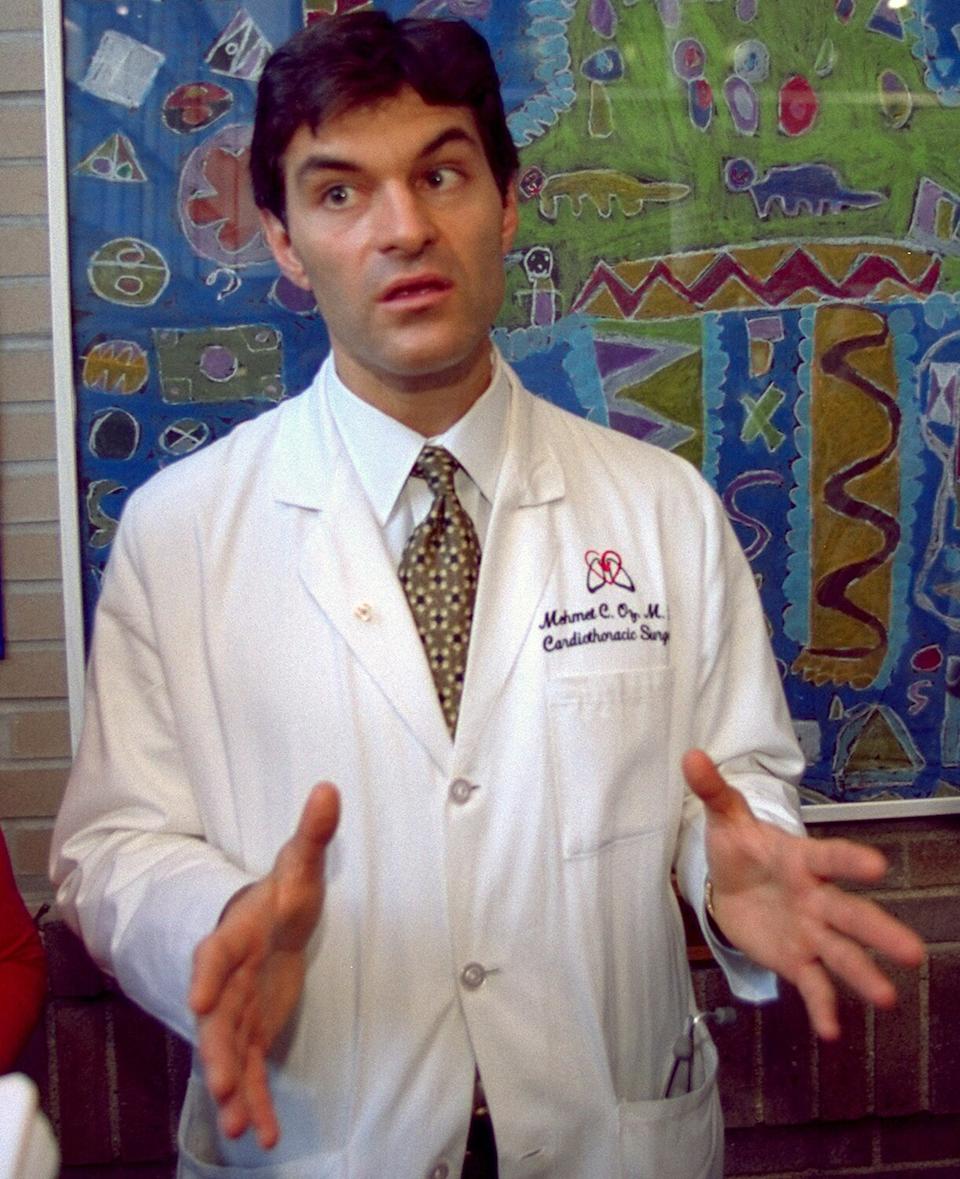Fact Check: Was Dr. Oz Responsible for Cruelly Experimenting on Dogs?

Kerem Kocalar/Anadolu Agency/Getty
Dr. Mehmet Oz — the TV personality turned Pennsylvania Republican candidate for U.S. Senate — is once again making headlines, this time for resurfaced claims that he experimented on dogs while a practicing heart surgeon at Columbia University.
On Monday, Jezebel reported the allegation that Oz oversaw medical research in which dogs were abused and killed for studies published between 1989 and 2010. After the Jezebel article was published, Oz's opponent in the Pennsylvania Senate race — Democrat John Fetterman — tweeted a link to the piece with the comment, "BREAKING: Dr. Oz is a puppy killer."
But is there evidence to support claims that Oz was, as the Jezebel article states, involved in research that "inflicted significant suffering" on animals used in experiments?
PEOPLE spoke with veterinarian Catherine Dell'Orto, who says that within weeks of her start as a post-doctoral fellow in the research labs at Columbia's Institute of Comparative Medicine in July 2001, she was horrified by what she saw.
Dell'Orto tells PEOPLE she witnessed the inhumane treatment of dogs in lab experiments investigating aspects of heart function over which Oz served in the role of "principal investigator" — including leaving dogs in pain and paralyzed for weeks, with no discernible research benefit, before they were euthanized or died.
BREAKING: Dr. Oz is a puppy killer. https://t.co/SXgRSUO2TK
— John Fetterman (@JohnFetterman) October 3, 2022
"When someone makes the choice to use an animal in a research experiment they should be 100 percent committed to reducing any suffering that animal will experience," says Dell'Orto. "And I did not see that happening with Oz. I saw the opposite."
Dell'Orto — who says she quickly raised her concerns with a senior veterinarian — did not see Oz in the labs performing any of the dog experiments, which she says were directly conducted instead by Ph.D. students and post-doctoral fellows.
RELATED: Dr. Oz Stopped Seeing Patients Years Before Senate Run but Still Teaches at Columbia
When PEOPLE reached out to Oz's Senate campaign team for comment, spokesperson Brittany Yannick said in an email: "Dr. Oz was not personally involved in these incidents and to say otherwise is a lie. His name was on some forms due to his role within the Department of Surgery."
Columbia's website says that when one is named principal investigator of a research study, he or she "has overall responsibility for safety and compliance in his or her laboratory."

Howard Earl Simmons/NY Daily News Archive via Getty
Dell'Orto said some principal investigators actually did come into the lab and directly oversee their animals' care, putting themselves in a position to ensure minimal suffering. With Oz, she says, "There were no endpoints. What I saw was abuse."
Dell'Orto says she has no personal knowledge to support online claims that research puppies cried out in pain as they were killed with no anesthesia. She says another lab worker, a veterinary technician whom she identified by name, claimed to have witnessed this, though PEOPLE has been unable to get in contact with the person alleged to be behind these claims.
It is that veterinary technician's account, says Dell'Orto, which PETA relied upon in a letter the group allegedly wrote to the USDA in 2003. That letter recounted a complaint, from an unidentified whistle blower, that "a litter of fully conscious puppies" was placed in a plastic bag and killed with expired euthanasia medication injected directly into their hearts, and that the puppies "cried out as they received the IC injection" because it was done without any prior pain killer.
But Oz himself is not mentioned in this letter, nor is he mentioned in the USDA's $2,000 settlement agreement with Columbia in 2004 — a settlement which explicitly states that Columbia neither admits nor denies the USDA's allegation.

Daniel Barry/Bloomberg News Columbia University
"The puppies killed in the bag were killed by a vet tech," not by Oz, Dell'Orto tells PEOPLE, noting she does not know if the puppies were part of an Oz-led study or one led by another principal investigator.
RELATED: The Viral Photo of Dr. Oz That's Taking the Internet by Storm Is Not Real
"But," she says, "there are a lot of valid things he did wrong."
During the period of time that Dell'Orto says she raised questions about the school's treatment of research animals, Oz was a cardiothoracic surgeon and Columbia University professor of surgery, as well as director of the Cardiovascular Institute at NewYork-Presbyterian/Columbia University Irving Medical Center.
Dell'Orto tells PEOPLE that before she resigned in February of 2003, she saw about 30 dogs upon whom research was performed as part of procedures for which Oz was principal investigator.
She says she saw some of these dogs' chests opened so that pacemakers could be inserted into their hearts, "pacing them at a very high rate to induce heart failure."
Then, she says, "they were doing different treatments to see what worked."
"I didn't think it was good science," Dell'Orto says. "I didn't think the results that came from such experiments were worthy of adding to the scientific database. It was so poorly done."
Never miss a story — sign up for PEOPLE's free daily newsletter to stay up-to-date on the best of what PEOPLE has to offer.
She says she also saw some of these dogs left paralyzed for days or weeks, apparently suffering and in pain before death via euthanasia. They'd lose more than 20% of their body weight and were left struggling to breathe, she says, adding that in her opinion, the study "was not designed" to promptly euthanize dogs at the point that the experiments became inhumane.
PEOPLE asked Oz's campaign team to respond to claims that the experiments for which he was principal investigator were conducted poorly and in many cases inhumane. Yannick, his spokesperson, responded: "While Dr. Oz was busy operating on human lives, researchers and veterinarians were in the Columbia University research labs finding new approaches to treat patients with atrial fibrillation which impacts millions of Americans."
She continued: "Dr. Oz was not in the operating room when the operations were done, he wasn't present during the post-op treatments, no one alerted him of the problem until after the cases were finished and he does not condone the mistreatment of animals."
Back at Columbia, Dell'Orto says she took her concerns — backed up with photocopies she made of three dogs' lab records with Oz as P.I. — to the administrator for the university's Institutional Animal Care and Use Committee in October of 2002. (She says the detail of the lab records she provided are now available online as part of a PETA site titled "Columbia University Cruelty.") These included dogs in Oz-led research. With one, Dell'Orto says she saw that from two days after painful surgery till the pup was euthanized, the dog, labeled 6269, was vomiting and unable to stand up, with bloody urine. Another dog was kept alive for 29 days post-operatively despite being paralyzed and with no clear research benefit, says Dell'Orto.
"Horrible things that went on," she says. "I mean, they just were not cared for properly. They were not given proper pain medications."

Barry Winiker/Getty Columbia University
Columbia set up a committee to investigate these concerns as well as other concerns she had about stroke research on baboons.
Dell'Orto then contacted the USDA, which oversees compliance with the Animal Welfare Act. And to make sure that the issue stayed at the forefront, she says she also contacted PETA.
RELATED: Dr. Oz Says He 'Misspoke' When He Suggested Kids Go Back to School amid Coronavirus Outbreak
By February 2003, Dell'Orto says she quit her job at Columbia. "I was shunned at that point," she says, "and I thought I could be more productive with a different job."
She worked for a small animal clinic in Ardsley, New York, and a year later moved to Tucson, Arizona, where she still lives, working with horses.
But her complaint led to several findings. An April 22, 2003, report by Columbia — which was obtained by PEOPLE — found that two of the three dogs used in Oz's research, for which Dell'Orto had provided records, received "inadequate or questionable veterinary care."
One dog — whose chest was opened (called a sternotomy) and received radiofrequency ablation on July 17, 2002 — developed paralysis, lethargy, vomiting and renal failure, suffering for a week. But "the records do not show why the animal was kept alive" until euthanized a week later, on July 24.
Another dog, which underwent the same procedure on July 11, 2002, "was in chronic distress (paralyzed in hindquarters)" but kept alive for 29 days until euthanized.
"The records did not contain a rationale for keeping the animal alive in a paralyzed condition for a prolonged period of time," the investigative committee wrote.

